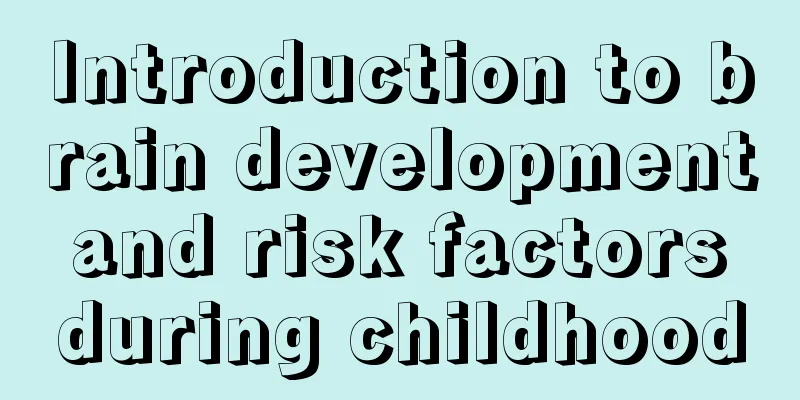Introduction to brain development and risk factors during childhood

|
We often say that children are the flowers of the future of the motherland and the hope of our motherland's development. Now more and more people are paying attention to children's development. This is something we need to pay attention to. We cannot ignore this situation, so we must pay attention to the brain development and risk factors during children's development period. So the editor would like to introduce to you the brain development and risk factors during children's development period. 1. Throughout the life cycle, early childhood is the most active period of brain development. During the first three years of life, proper stimulation and good nutrition are key for young children to thrive. During these three years, children's brains are extremely sensitive to the influence of the external environment. Rapid brain growth promotes intellectual, social and emotional development, helping to ensure that every child realizes his or her potential and becomes an active member of a rapidly changing global society. The more stimulated children are in their early environments, the better they develop and the better they are at learning. Language and intellectual development are particularly important during the first 6 months to 3 years of age. If young children are not adequately stimulated or properly nurtured psychologically and physically, brain development can be affected, leading to delayed intellectual, social, and behavioral development. These children will find it difficult to cope with complex situations and environments in the future. 2. Experiencing major setbacks and stress in early childhood may increase the risk of developing stress-related diseases and learning disabilities in adulthood. Risk factors Toddler development can be affected by many factors. At least 20% to 25% of infants and young children in developing countries are affected by the following four risk factors: Chronic, severe malnutrition that impedes development; Lack of stimulation or learning opportunities; Iodine deficiency; Iron deficiency anaemia; Malaria, intrauterine growth restriction, maternal depression, violence and heavy metal pollution are also major risk factors. 3. Developing early emotional connections with caregivers is also important for infant growth. Frequent changes in caregivers and a lack of family affection (such as in poorly managed orphanages) can have serious adverse effects on brain development and cognitive ability. IV. Intervention measures In order to realize their potential, young children need to be provided with a warm and active environment, their needs should be taken seriously, and they should not be subjected to inappropriate reprimands or punishments. Parents and families are key to early childhood development but need support in providing the right environment. Children benefit when governments adopt family-friendly social protection policies that guarantee adequate income, maternal benefits and financial support, and allow parents and caregivers the time and energy to care for young children. We say that the healthy development of children is the key to the future of our country. This is something we must know. When we face these, it is necessary for us to care about children's problems. The editor is here to introduce the brain development and risk factors during the development period of children. I hope that all children can grow up healthily! |
<<: How to treat hypertension in children?
>>: Why do children have big bellies?
Recommend
Six-year-old child has white spots on his face
In people's eyes, perhaps a few white spots w...
Taboos for eczema on the face of a one-month-old baby
After a child is born, its skin is not yet fully ...
Will babies have constipation during the confinement period?
Holding the baby's stomach in check refers to...
Early symptoms of autism in newborns
Many friends simply think that autism is a psycho...
Children shake their heads when they sleep, mainly because of this
Many times when parents watch their babies sleep,...
Baby's stool smells fishy and contains mucus
Careful parents will observe that children are ac...
The child drinks too much water and urinates frequently
Because the weather is dry, many parents like to ...
What to do if your baby has eczema on his neck
The baby's skin is relatively fragile, so try...
How to correct uneven teeth in children
Children always encounter various bad situations ...
Scabs behind baby's ears?
It is actually normal for babies to have scabs on...
What causes recurrent respiratory infections in children?
Today, the editor will take you to understand the...
What to do if your child has blisters on his feet?
Sometimes, because children are too young, they d...
Baby's nose bleeds in the middle of the night
If your baby has a nose bleed in the middle of th...
What causes foamy stools in babies?
We all know that as the baby grows day by day, hi...
Redness and swelling at the injection site
Children from birth to six years old need to get ...









